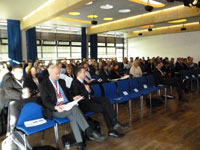5 Dec 2012
A total of 154 delegates attended the 5th Water Contamination Emergencies conference held at the impressive RWW Water Treatment Works conference facility just outside Mülheim an der Ruhr in Germany from 19 - 21 November 2012.
Delegates attended from 26 countries demonstrating the truly international nature of the conference and its importance. Scottish Water sent three delegates and provided two excellent presentations 'Risk governance and the Board - supporting pervasive risk management in water utilities' by Richard Allan and 'The true public health implications on unintentional water contamination events?' by Margaret McGuinness. It was disappointing to note that the 21 English water companies only sent one delegate.
The first of this series of conferences was held back in 2003 with the title 'Can we cope?' and further conferences to address this key question were held in 2005 ('Enhancing our response'), 2008 ('Collective responsibility') and 2010 ('Monitoring, understanding, acting'.) This event dealt with the question of how to manage the threats.
The formal programme followed a scene-setting introduction and included presentations in the areas of 'How do we assess and manage the risks?', 'Real life examples', 'Lessons learnt' and 'What can be done in future?' A parallel session with five presentations ran for part of the second day and covered 'Technological advances'. This session was mainly looking at new methods of monitoring and analysis with a final presentation entitled 'Best practice protocols for response and recovery operations in contaminated water systems.'
This key final session included presentations on the significance of the internal surface of mains pipes in drinking water distribution networks; contamination source and spread issues; limitations of remediation techniques for decontaminating drinking water networks; and how to balance CAPEX/OPEX against safety, costs and time constraints followed by a final summing up session.
The 11 keynote speakers represented the EU, the World Health Organisation, the UK Health Protection Agency, and various international academic and industrial organisations. Some 28 technical papers covered subjects as diverse as the Fukushima earthquake and its consequences, risk governance and assessment, hydraulic modelling, water quality deterioration and the application of sensors, recovery and decontamination strategies after contamination, health implications of contamination and systems to enhance protection in the future. Many of the presentations can be viewed online (link below).

Some 35 posters were accepted and ten authors had the opportunity to make short presentations. There were eleven exhibitors and their stands generated much interest.
The conference dinner was held in the very imposing Muelheim Municipal Hall and the Muelheim Water Award and two best poster prizes were made.
Proceedings of the conference containing full papers and poster presentations will be published in book format, as per the proceedings of the previous four conferences. Papers will be edited by three organising committee members and reviewed by the RSC before publication. Editing will start in January 2013 and proceedings should be available from May 2013. Proceedings may be purchased direct from RSC Publishing. There should also be a special package deal available to purchase all five WCEC event proceedings.
The conference had three principal sponsors: RSC-WSF, SCI and IWW. SecurEau co-organised the event and seven other sponsors also gave valuable support.
- SecurEau held a separate security dissemination workshop afterwards to allow the transfer of classified results from its major project, SecurEau FP7, which looked at security and decontamination of drinking water distribution systems following a deliberate contamination.
Prof K Clive Thompson
Chair, Environment Group
